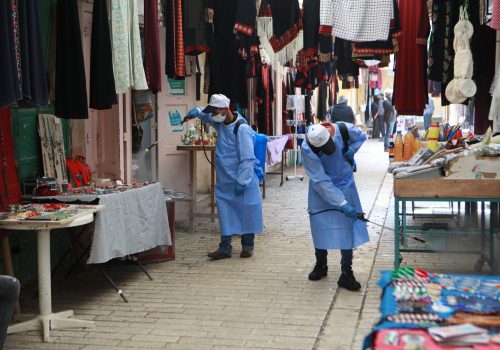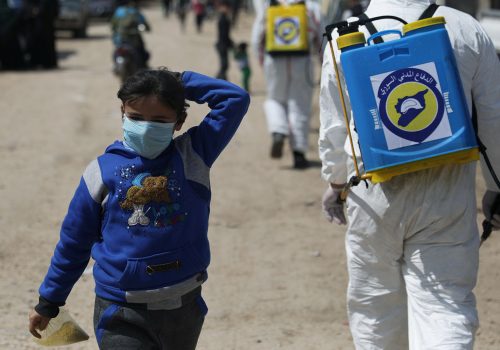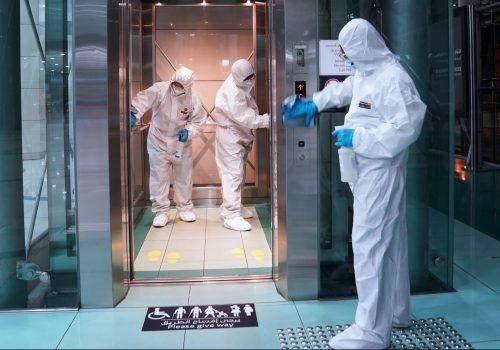Aid groups desperately look for other options to combat coronavirus
The migrants and refugees were stranded, sometimes sleeping huddled together out in the cold. Syrians, Afghans, Iranians and others had rushed to the Turkish border with Greece in hopes of crossing into the European Union. Instead, they were stuck, blocked by Greek authorities from entering, and often destitute. Meanwhile, a pandemic had struck, triggering lockdowns across the world, making it nearly impossible for aid workers to reach them.
Ultimately, United Nations officials confined to their homes and compounds worked with a loose network of ad hoc volunteers to get people aid, including soap and food, as well as bus tickets back to their temporary homes. Flexibility, combined with entrusting locals to take the lead, helped avert a disaster.
As feared, coronavirus is beginning to impact the most desperate areas of the world, ripping through refugee camps and infiltrating conflict zones such as Libya, Syria, and Afghanistan.
The pandemic has already challenged some of the greatest healthcare systems in the world, ravaging the Netherlands, Italy, and the United Kingdom, all famed for the quality of their care, as well as Iran, which has one of the best medical systems in the surrounding region. It’s horrific to imagine what it could do to the war-ravaged countries in the Middle East and Africa. Northeast Syria, for example, has only twenty-eight beds in intensive care units and ten ventilators, according to the International Rescue Committee, which has warned that COVID-19 could ultimately infect 1 billion worldwide and cause the deaths of 3.2 million people.
Helping overcome a disease in a war zone poses unique and formidable challenges. The nature of coronavirus transmission makes it particularly deadly to densely populated communities, such as those living in refugee camps. In al-Hol, 160,000 displaced Syrians live packed into an area with a population density of 37,500 people per square kilometer, a rate higher than the Indian city of Mumbai.
In the Muslim world, the outbreak of the pandemic has coincided with the holy month of Ramadan, traditionally a time of communal prayer and meals.
United States officials said, last week, that Washington has contributed $775 million in aid worldwide to combat the coronavirus pandemic, earmarking money for testing, labs and economic recovery. But getting that aid to vulnerable populations amidst a pandemic is a huge challenge.
Luckily, aid organizations, including some that addressed the Ebola epidemic of the last decade, are well-placed to address the needs of communities that are, sometimes, doubly or triply at risk.
As was seen in Turkey, earlier this year, entrusting the delivery of aid to local groups already on the ground is key. Any aid that helps leapfrog over layers of bureaucracy and geography can help. In Nigeria, for example, a $500,000 relief fund established by Royal Dutch Shell, an oil and gas company, is helping bring solar energy power to clinics and healthcare organizations on the front lines of coronavirus.
“It is an exemplary intervention that will facilitate the success of the fight against the virus,” Dr. Anthony Iwala, the social franchise director at the Society for Family Health, said in a press release. “Electricity from their solar systems will ensure staff are properly kitted, able to prepare instruments and medication without compromising infection prevention protocols.”
Another key to aid groups’ efforts is making allies of local religious and community leaders who can disseminate information about avoiding the illness and treating it. Across the world, many of the earliest and worst outbreaks of COVID-19 were rooted in religious gatherings by many of the world’s major faiths. Relief organizations urge deliverers of aid to make quick alliances with religion.
“The religious guidance in Islam is based around teaching and law around prayer and a range of other things,” Atallah FitzGibbon, an official at Islamic Relief Worldwide, which provides aid to distressed people in Syria, Pakistan, Mali, and Afghanistan, said in an online briefing. “Jurisprudence in Islamic teaching is based on a system of ethics which allows scholars to adjust practice based on a set of principles and allows the religion to be flexible to such events.”
Special caution is also merited when distributing aid in a conflict zone, lest it exacerbates a war or contributes to ongoing political repression. During a press briefing last week, John Barsa, acting administrator of USAID, boasted that Washington was providing $125 million to Middle East governments, a risky endeavor in a polarized region where aid can be used to reward allies or withheld to punish foes.
“You have to make sure the way you deliver aid doesn’t favor one group over others, which could make a conflict worse,” Bridget Moix, executive director of Peace Direct, a London-based advocacy group, said to this author. “You have communities which may not trust the government. You have to find [those] who are the trusted messengers in an environment where the government may not be trusted.”
Peace Direct recently surveyed several hundred local activists worldwide to come up with guidelines for delivering aid to conflict areas. Among the findings, was that the pandemic was heating up armed conflicts rather than cooling them down, and that governments were exploiting the disease to crackdown on civil society, including those who could help alleviate the impact of the disease.
The desperation in some areas is accelerating. In places like Yemen and Afghanistan, civilians were already suffering intense food insecurity and the threat of violence. Coronavirus has added yet another layer of misery.
“It makes our work more imperative, and also more complex,” Bob Kitchen, emergency director at the International Rescue Committee, said to this author.
While such aid organizations have learned to delegate sensitive tasks to frontline caregivers already embedded in local communities, the larger organizations can make their work easier by lobbying governments in places like Jordan, Afghanistan, and Pakistan for waivers from lockdowns and social distancing regulations.
The pandemic has also prompted the International Rescue Committee and other organizations to reconfigure the way they provide aid.
The old way of having people cue up a truck or depot to receive aid packages is no longer viable. Instead, recipients must schedule appointments to pick up the aid. It’s no longer possible to gather local community leaders in a classroom to brief them on hygiene precautions to prevent the spread of coronavirus. One solution is to send out educational videos and media via messaging apps such as WhatsApp or Telegram, using the smartphones and wireless internet many have access to.
But, perhaps, the best tool that aid groups can use to deliver aid to the most vulnerable is cold hard cash, either delivered in envelopes or deposited into bank accounts when possible. It not only helps families get the food and hygiene supplies they urgently need, it also keeps local shops up and running.
With economic crises ballooning in rich countries, many donor nations may be reluctant to pitch in. Even prior to the coronavirus outbreak, those in the wealthy West have often found it easy to ignore the plight of poor people suffering in a distant land.
But a pandemic is different. It is not a disaster that can be geographically compartmentalized. This was shown in Singapore, where COVID-19 was largely tamed before boomeranging back in through the dormitories and camps that house poor migrant workers.
Pathogens don’t care if you’re rich or poor, living in a Manhattan high-rise or a refugee camp in the war-ravaged Idlib province. Those living in wealthy and peaceful countries ignore the suffering of others at their own peril.
Borzou Daragahi is an international correspondent for The Independent. He has covered the Middle East and North Africa since 2002. He is also a Nonresident Fellow with the Atlantic Council’s Middle East Security Initiative. Follow him on Twitter: @borzou.
Image: EDIRNE, TURKEY- In the photos, immigrants are seen near the border of Turkey with Greece in the province of Edirne, Turkey, on March 3, 2020.



